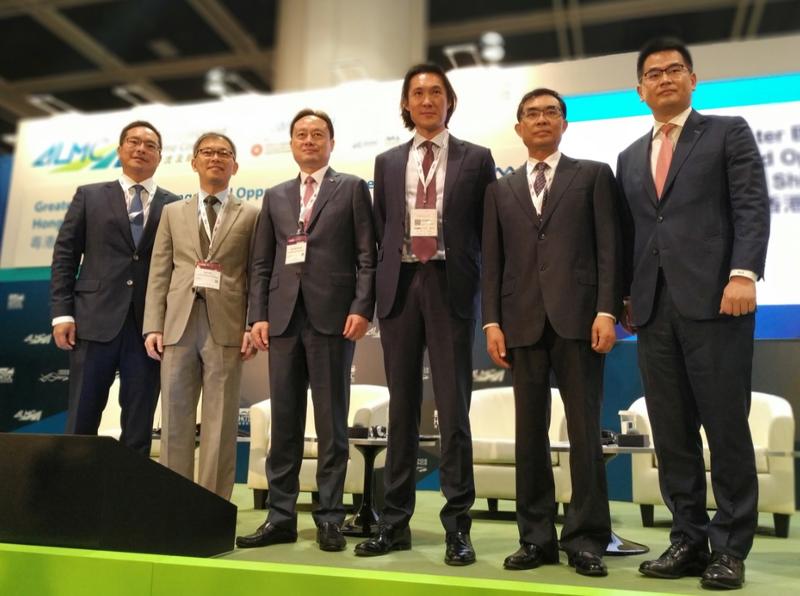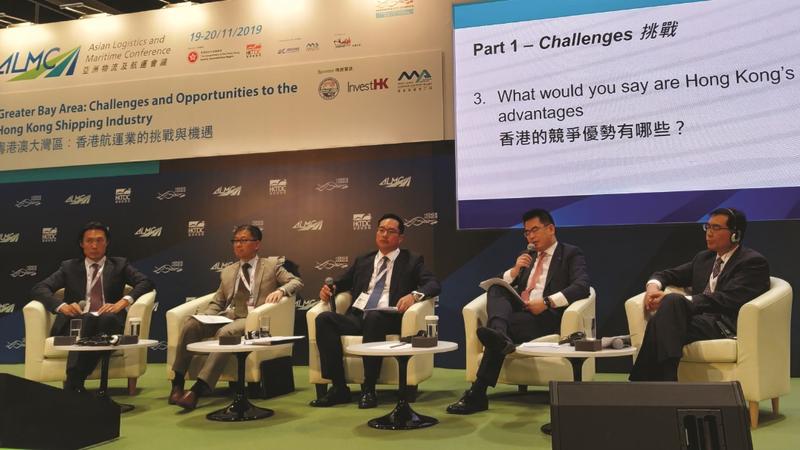 Shipping industry executives participated in the Ninth Asian Logistics and Maritime Conference held Nov 19-20 in Hong Kong (L-R) Kenneth Lam Sze-kin, chairman and chief executive officer of Credit Agricole Asia Shipfinance; Jack Hsu, chairman of the Hong Kong Shipowners Association; Xie Chunlin, chairman of China Merchants Energy Shipping Co; Chao Sih-hing, executive chairman of Hong Kong-based Wah Kwong Maritime Transport Holdings; Su Xingang, director of China Merchants Energy Shipping Co; and Min Li, partner, Reed Smith Richards Butler. (PRIME SARMIENTO FOR CHINA DAILY)
Shipping industry executives participated in the Ninth Asian Logistics and Maritime Conference held Nov 19-20 in Hong Kong (L-R) Kenneth Lam Sze-kin, chairman and chief executive officer of Credit Agricole Asia Shipfinance; Jack Hsu, chairman of the Hong Kong Shipowners Association; Xie Chunlin, chairman of China Merchants Energy Shipping Co; Chao Sih-hing, executive chairman of Hong Kong-based Wah Kwong Maritime Transport Holdings; Su Xingang, director of China Merchants Energy Shipping Co; and Min Li, partner, Reed Smith Richards Butler. (PRIME SARMIENTO FOR CHINA DAILY)
The Greater Bay Area will help strengthen Hong Kong’s position as one of the world’s key international maritime centers, industry participants said.
In a panel discussion held at the Ninth Asian Logistics and Maritime Conference in Hong Kong, shipping industry leaders said Hong Kong’s position as the Bay Area's maritime center will support the special administrative region’s position as a dominant player despite increasing competition from other key transport and logistics centers.
The annual two-day conference, which ended on Nov 20, was organized by the Hong Kong Trade Development Council (HKTDC) and the Hong Kong Special Administrative Region government.
The Greater Bay Area has particular focus on logistics and shipping. With more resources in the region, the Hong Kong shipping industry will become stronger
Min Li, Partner at the global law firm Reed Smith Richards Butler
ALSO READ: China to accelerate approval of GBA development projects
“Hong Kong’s greater proximity to mainland China and the Greater Bay Area give us an advantage over (other maritime centers like) Singapore,” said Chao Sih-hing, executive chairman of Hong Kong-based Wah Kwong Maritime Transport Holdings.
Chao, who moderated the discussion, also cited Hong Kong’s role as an international maritime arbitration center. He said Hong Kong is recognized globally for dispute resolution and how it benefits from the “one country, two systems” principle.
“We benefit from a mature legal framework and the advantage of having a unique relationship with China,” he said.
Industry executives said the Greater Bay Area gives Hong Kong an opportunity to tap a vast talent pool in 11 cities, encourage innovation and attract more financing.
“The Greater Bay Area has particular focus on logistics and shipping. With more resources in the region, the Hong Kong shipping industry will become stronger,” said Min Li, partner at the global law firm Reed Smith Richards Butler.
He said being part of the Bay Area will also support Hong Kong’s role as a finance and dispute resolution center in the Belt and Road Initiative.
Jack Hsu, chairman of the Hong Kong Shipowners Association, said Hong Kong’s shipping industry can help the Hong Kong government in engaging more with the Greater Bay Area.
“In terms of thought leadership and facilitating dialogue with the Hong Kong government, on how to take the leading role in the Bay Area, is something that we can provide guidance on,” Hsu said.
Su Xingang, director of China Merchants Energy Shipping Co, said China has provided high-quality talent to Hong Kong’s maritime industry. He said China has at least five universities and over 100 vocational schools that specialize in maritime training and education. These schools will continue to staff the Hong Kong shipping industry with highly-skilled seafarers and help maintain its leadership in the maritime industry.
Kenneth Lam Sze-kin, chairman and chief executive officer of Credit Agricole Asia Shipfinance, expects that Hong Kong’s development of “green finance” will lead to funding and promotion of technology that will reduce the shipping industry’s carbon footprint. He said “green financing” combined with the Bay Area’s talent pool can produce an innovative solution for the shipping industry.
Lam added that the proposed maritime leasing bill, which will extend tax breaks for ship lessors and leasing managers, will attract more companies to Hong Kong.
“What kind of capital do we need? Capital that is sustainable. Capital that is committed,” he said, noting that this is the kind of funding that maritime leasing companies can bring in. This, he said, will further cement Hong Kong’s position in the global maritime trade.
 Shipping industry executives discuss the challenges and the competitive advantage of the Hong Kong maritime industry during the Ninth Asian Logistics and Maritime Conference. (L-R) Chao Sih-hing, executive chairman of Hong Kong-based Wah Kwong Maritime Transport Holdings and moderator of the panel discussion; Jack Hsu, chairman of the Hong Kong Shipowners Association; Kenneth Lam Sze-kin, chairman and chief executive officer of Credit Agricole Asia Shipfinance; Min Li, partner, Reed Smith Richards Butler; and Su Xingang, director of China Merchants Energy Shipping Co. (PRIME SARMIENTO FOR CHINA DAILY)
Shipping industry executives discuss the challenges and the competitive advantage of the Hong Kong maritime industry during the Ninth Asian Logistics and Maritime Conference. (L-R) Chao Sih-hing, executive chairman of Hong Kong-based Wah Kwong Maritime Transport Holdings and moderator of the panel discussion; Jack Hsu, chairman of the Hong Kong Shipowners Association; Kenneth Lam Sze-kin, chairman and chief executive officer of Credit Agricole Asia Shipfinance; Min Li, partner, Reed Smith Richards Butler; and Su Xingang, director of China Merchants Energy Shipping Co. (PRIME SARMIENTO FOR CHINA DAILY)
READ MORE: Chinese abroad urged to take active role in GBA development
Hong Kong is well-known as an international trade, financial and shipping center. The HKTDC said that, in 2017, Hong Kong was the world’s 7th largest trading economy and the world’s 4th largest shipping register following Panama, Marshall Islands and Liberia.
In 2018, Hong Kong overtook London and became the second leading maritime center in the world, according to the International Shipping Centre Development Index, published by the Baltic Exchange and Xinhua News Agency. Hong Kong has managed to retain its second rank in the index – behind global leader Singapore – this year as well.


